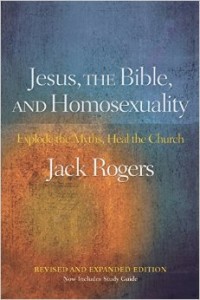Published in: September-October 2006 issue.
 Jesus, the Bible, and Homosexuality
Jesus, the Bible, and Homosexuality
by the Rev. Dr. Jack Rogers
Westminster John Knox Press, 155 pages, $17.95
THE PRESBYTERIAN CHURCH (USA) cracked the door open for the ordination of gay men and women at its annual General Assembly meeting (the 217th) last June with an “authoritative interpretation” that allows local ordaining bodies some leeway. One might be tempted to speculate on the impact a particular book had on that decision. Jack Rogers, Professor of Theology Emeritus at San Francisco Theological Seminary and author of Jesus, the Bible, and Homosexuality, was moderator of the pcusa General Assembly four years ago and has had a hand in educating many of its ministers.






